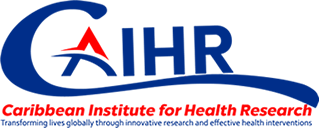About the CAIHR
Vision Statement
"Transforming lives globally through innovative research and effective health interventions."
Mission Statement
"To enhance the health and well-being of Caribbean and global populations through innovative research, training and strategic partnerships, providing timely knowledge dissemination and translation for sustainable development."
Background

The Caribbean Institute for Health Research (CAIHR), formerly known as the Tropical Medicine Research Institute, was established in 1999 as a Caribbean-wide health research institution of The University of the West Indies (The UWI). The Institute was created from existing research units, and through the formation of the Epidemiology Research Unit. It comprises three (3) units on the Mona campus in Jamaica: the Epidemiology Research Unit (ERU), Sickle Cell Unit (SCU) and Tropical Metabolism Research Unit (TMRU), and the George Alleyne Chronic Disease Research Centre (GA-CDRC) at Cave Hill, Barbados. The CAIHR functions administratively as one institute with a senior management team comprising Directors and Professors. Research direction and leadership is provided by the Institute's Director and the Unit Directors as well as leaders of respective research programme areas. The Institute reports to the Vice-Chancellor of The UWI through the Pro‐Vice-Chancellor for Research, and to the Principals of the Mona and Cave Hill campuses for the relevant units.
The CAIHR was formed with the primary remit of conducting high quality research that addresses regional and global health priorities. The aim was to further The UWI’s strategic objective of increasing research through centres of excellence, and thereby enhancing the visibility of the University. The larger critical mass of active health researchers within CAIHR was expected to contribute to increased health research output of The UWI, facilitated by collaboration among the units. Another objective was greater collaboration with Faculties within the University, particularly the Faculty of Medical Sciences (FMS), which would benefit research output as well as strengthen research capacity in the FMS through collaboration and research training activities.








